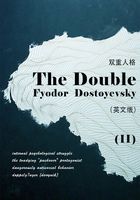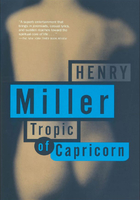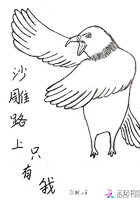again a few days after the typewriter episode. It was 7:30 a.m., and after getting the first newscast of the day ready to go on the air, I was heading for the Bransa to have my morning café con leche. As I passed by the little window of the concierge's cubicle at Radio Central, I spied my Remington. I could hear its heavy keys hitting the platen, but I couldn't see anybody sitting behind it. I stuck my head through the window and saw that it was Pedro Camacho who was typing away. An office had been set up for him in the concierge's cubbyhole. In this tiny room, with a low ceiling and walls badly damaged by the dampness and by the ravages of time and desecrated by countless graffiti, there was now a monumental wooden desk, so dilapidated that it was about to fall apart, but nonetheless as imposing as the enormous typewriter rumbling away on it. The outsize dimensions of the desk and the Remington literally swallowed up the little runt. He had put a couple of cushions on the seat of his chair, but even so, his face came up no higher than the keyboard, so that he was typing away with his hands at eye level, thus causing him to appear to be boxing. He was so totally absorbed in his work that he didn't even notice my presence, despite the fact that I was leaning right over him. His pop-eyes were riveted on the paper as he pecked at the keys with his two forefingers, biting his tongue. He was wearing the same black suit as on the first day, and had taken off neither his suit coat nor his little bow tie. At the sight of him, with his long hair and his attire mindful of a nineteenth-century poet, sitting there rigid and dead-serious, concentrating all his attention on what he was typing so furiously, in front of that desk and that typewriter that were far too big for him, in this den that was much too small for the three of them, I couldn't quite decide whether the whole scene was pitiful or wildly funny.
'You're certainly an early riser, Se?or Camacho,' I greeted him, stepping halfway into the room.
Without even looking up from the paper, he merely indicated, with a peremptory jerk of his head, that I should either shut up or wait, or both. I chose the latter course, and as he finished his sentence, I noted that the desktop was littered with typed pages, and the floor strewn with discarded pages he'd wadded up into a ball and tossed there because no one had thought to provide him with a wastebasket. A few moments later his hands fell away from the keyboard, he looked up at me, rose to his feet, ceremoniously held out his right hand, and answered my greeting with a maxim: 'Clock time means nothing where art is concerned. Good morning, my friend.'
I didn't ask if he was suffering from claustrophobia in this tiny cubbyhole, since I was certain he would have answered me that discomfort was propitious to art. Instead, I invited him to come with me to have coffee. He consulted a prehistoric artifact clumsily sliding back and forth on his skinny wrist and murmured: 'After an hour and a half of production, I deserve time out for refreshment.' As we walked over to the Bransa, I asked him if he always began work that early in the morning, and he replied that in his case, unlike that of other 'creators,' inspiration was directly proportional to daylight.
'It dawns with the sun and gradually grows warmer along with it,' he explained, musically, as a drowsy waiter swept the sawdust littered with cigarette butts and the refuse of the Bransa out from under our feet. 'I begin to write at first light. By noon, my brain is a blazing torch. Then the fire dies down little by little, and around about dusk I stop, inasmuch as only embers remain. But it doesn't matter, since the actor produces more in the afternoon and at night. I have my system all carefully plotted out.'
He delivered himself of this peroration in utter seriousness, and I realized that he scarcely seemed to notice that I was still there; he was one of those men who have no need of conversational partners: all they require is listeners. Like the first time we'd met, I was taken aback by his total lack of humor, despite the puppetlike smiles – lips turning up at the corners, brow wrinkling, teeth suddenly bared – with which he embellished his monologue. His every word was uttered with extraordinary solemnity, all of which – along with his perfect diction, his dwarflike stature, his bizarre attire, and his theatrical gestures – made him appear to be an odd sort indeed. It was obvious that he took everything he said to be the gospel truth, and he thus gave the impression of being at once the most affected and the most sincere man in the world. I did my best to bring him down from the artistic heights on which he was holding forth so grandiloquently to the more earthly plane of practical matters, and asked him if he had found a place to live yet, if he had friends here, how he liked Lima. Such mundane considerations were of no interest to him whatsoever. Impatiently breaking off his flight of eloquence, he replied that he had found an 'atelier' not far from Radio Central, on Quilca, and that he felt at home wherever he found himself, for wasn't the entire world the artist's homeland? Instead of coffee, he ordered a lemon verbena-and-mint herb tea,which, he informed me, not only was pleasing to the palate but also 'toned up one's mind.' He downed it in short, symmetrical sips, as though he had calculated the precise intervals at which to raise the cup to his lips, and the moment he'd finished it, he rose to his feet, insisted on splitting the check, and asked me to go with him to buy a map showing the streets and districts of Lima. We found what he wanted at an outdoor newsstand along the Jirón de la Unión. He unfolded the map, held it up to the light, studied it, and was pleased to note that the various districts of the city were marked off in different colors. He also asked for a receipt for the twenty soles the map had cost him.
'It's something I need for my work and my employers should reimburse me,' he declared, as we walked back to our respective offices. His walk was also quite odd: quick, nervous strides, as though he were afraid he'd miss a train.
As we bade each other goodbye at the entrance to Radio Central, he gestured in the direction of his cramped little cubbyhole of an office as though he were proudly showing off a palace. 'It's practically right out in the middle of the street,' he said, pleased with himself and with things in general. 'It's as if I were working out on the sidewalk.'
'Won't all the noise of so many people and cars passing by distract you?' I ventured to ask.
'On the contrary,' he reassured me, delighted at the chance to offer me one last edifying maxim: 'I write about life, and the impact of reality is crucial to my work.'
As I turned to leave, he waggled his forefinger to call me back. Pointing to the map of Lima, he asked me, in a tone of voice fraught with mystery, if I would be willing, later on that day or the day after, to provide him with further information about the city. I told him I'd be more than happy to do so.
Back in my shack at Panamericana, I found that Pascual had already written up the text of the 9 a.m. news bulletin. It began with one of those items he took such delight in. He had copied it from the morning paper, La Crónica, embellishing it with fancy adjectives he'd picked up in the course of his studies and made an intimate part of his cultural stock in trade: 'In the tempestuous seas of the Antilles, the Panamanian freighter Shark sank last night, taking with it to their death its crew of eight, drowned and masticated by the sharks that infest the aforementioned sea.' I changed 'masticated' to 'devoured' and edited out 'tempestuous' and 'aforementioned' before giving it my okay. Pascual didn't fly into a rage – that wasn't his way – but he nonetheless put his protest on record. 'Good old Don Mario, fucking up my style as usual.'
All that week I'd been trying to write a short story, based on an incident that my Uncle Pedro, who was a doctor on a big landed estate in Ancash, had passed on to me. One night a peasant had frightened another peasant half to death by disguising himself as a 'pishtaco' – a devil – and leaping out at him from the middle of a canebrake. The victim of this joke had been so scared out of his wits that he'd attacked the 'pishtaco' with his machete, dispatched him to the next world with a skull split in two, and taken to the hills. Shortly thereafter, a group of peasants leaving a fiesta had come upon a 'pishtaco' prowling around the village and beaten him to death. The dead man turned out to be the murderer of the first 'pishtaco,' who was in the habit of disguising himself as a devil in order to visit his family at night. These assassins had in turn taken to the hills, and used to come down at night in the guise of devils to visit the community, where two of them had already been hacked to death with machetes by the terror-stricken villagers, who in turn, et cetera … What I was eager to recount in my story was not so much what had actually happened on the estate where my Uncle Pedro was employed as the ending of the story that suddenly occurred to me: at a certain moment, the Devil in person, alive and kicking and wagging his tail, slipped in among all these fake 'pishtacos.' I was going to entitle my story 'The Qualitative Leap,' and I wanted it to be as coldly objective, intellectual, terse, and ironic as one of Borges's – an author whom I had just discovered at that time. I devoted to the story all the spare moments left me by the news bulletins at Panamericana, the university, and coffee breaks at the Bransa, and I also wrote at my grandparents' house, during my lunch hours and at night. During that week, I didn't drop in at any of my uncles' houses for the midday meal, skipped my usual visits to my girl cousins', and didn't go to the movies even once. I wrote and then tore up what I wrote, or rather, the moment I'd written a sentence it struck me as absolutely dreadful and I began all over again. I was thoroughly convinced that a slip of my pen or a mistake in spelling was never a mere happenstance but rather a reminder, a warning (from my subconscious, God, or some other being) that the sentence simply wouldn't do at all and had to be rewritten. Pascual protested: 'Good Lord, if the Genaros discover how much paper you've wasted, they'll take it out of our salary.' Finally, one Thursday, it seemed to me that the story was finished. It was amonologue five pages long: at the very end, the reader discovered that the narrator was the Devil himself. I read 'The Qualitative Leap' to Javier in my shack, after the noon Panamericana newscast.
'It's first-rate, old pal,' he said approvingly, applauding. 'But is it really possible to write about the Devil nowadays? Why not write a realistic story? Why not do away with the Devil altogether and make the whole thing a series of incidents involving fake "pishtacos"? Or, alternatively, an outright fantastic tale, with all the ghostly apparitions you like. But no devils, because that smacks of religion, of hypocritical piety, of all kinds of things that are terribly old hat these days.'
When he left, I tore 'The Qualitative Leap' to bits, tossed it into the wastebasket, decided to forget all about 'pishtacos,' and went to have lunch at my Uncle Lucho's. I learned there that there was apparently a budding romance between Aunt Julia and a man I'd never met but had heard a lot about: Adolfo Salcedo, the owner of a large estate and the senator from Arequipa – a distant family relation.
'Fortunately, Julia's new suitor has piles of money, a high social standing, and lots of influence, plus honest intentions toward her,' my Aunt Olga commented. 'He's asked for her hand in marriage.'
'Unfortunately, Don Adolfo's fifty and hasn't yet done a thing to prove that that terrible thing his wife accused him of was false,' Uncle Lucho retorted. 'If your sister marries him, she's either going to have to live in chastity or take to adultery.'
'That whole story about him and Carlota is a typical bit of slanderous Arequipa gossip,' Aunt Olga argued. 'Adolfo gives every appearance of being a real man.'
I knew that 'whole story' about the senator and Do?a Carlota very well, since it had been the subject of another short story of mine that Javier's praise had caused me to consign to the wastebasket. The marriage of Don Adolfo and Do?a Carlota had been the talk of the entire south of the Republic, since both of them owned huge tracts of land in Puno and the pooling of their holdings would thus create yet another enormous landed estate. The two of them had done things in the grand manner: a wedding ceremony in the splendid Church of Yanahuara attended by guests from all over Peru, followed by a Pantagruelian banquet. During the second week of their honeymoon, the bride had upped and left her spouse somewhere or other, returned all by herself to Arequipa to the scandal of everyone, and announced, to everyone's stupefaction, that she was about to appeal to Rome for a formal annulment of their marriage.
Adolfo Salcedo's mother had met Do?a Carlota one Sunday after eleven o'clock Mass, and right there in the middle of the portico of the cathedral had asked her to her face, in utter fury: 'Why did you abandon my poor son as you did, you shameless creature?'
With a superbly haughty wave of her hand, Do?a Carlota had answered in a voice loud enough for everyone to hear: 'Because, se?ora, the only use to which your son puts that particular piece of equipment that men are endowed with is to make peepee.'
She had managed to have the religious marriage annulled, and Adolfo Salcedo had been an inexhaustible source of jokes at our family gatherings. From the day the senator had first met Aunt Julia, he had besieged her with invitations to the Bolívar Grill and the '91,' showered her with gifts of perfume, and bombarded her with baskets of roses. I was happy to hear of the romance and hoped that Aunt Julia would turn up, so I could get in a few nasty digs about her new suitor. But she took the wind out of my sails when, appearing in the dining room in time to have coffee with us, with her arms loaded with parcels, she was the one who announced, laughing fit to kill: 'All that gossip turned out to be perfectly true. Senator Salcedo can't get it up!'
'Julia, for heaven's sake, don't be vulgar,' Aunt Olga protested. 'Anybody would think that …'
'He told me so himself, just this morning,' Aunt Julia explained, gloating over the senator's tragedy.
He'd been quite normal up until the age of twenty-five. And then, in the course of an ill-starred trip to the U.S. on vacation, the terrible mishap had occurred. In Chicago, San Francisco, or Miami – Aunt Julia didn't remember which exactly – young Adolfo had met a woman in a night club and made a conquest (or so he thought). She had taken him to a hotel, and he was going at it hot and heavy with her, when suddenly he felt the point of a knife blade in his back, turned around, and saw a one-eyed man a good six feet six inches tall. They didn't use the knife on him or beat him; they merely robbed him of his watch, a gold religious medal, his dollars. That was how it all began. Simple as that. Ever since then, the minute he was with a woman and about to get down to some serious action, he would feel the touch of cold metal on his spinal column, see the ravaged face of the one-eyed man, start to sweat, and find himself with all desire gone and his spirits drooping. He had consulted an endless number of doctors and psychologists, and even a quack healer in Arequipa, who had him bury himself up to the neck at the foot of volcanoes on moonlit nights.
'Don't be mean, don't make fun of the poor man, Julia,' Aunt Olga said, shaking with laughter.
'If I were certain he'd stay that way, I'd marry him for his dough,' Aunt Julia said crassly. 'But what if I cured him? Can't you just see that old gaffer trying to make up for lost time with me?'
I thought how happy the adventure of the senator from Arequipa would have made Pascual, how enthusiastically he would have devoted an entire newscast to him. Uncle Lucho warned Aunt Julia that if she was going to be so demanding, she'd never find a Peruvian husband. And she in turn complained that here too, as in Bolivia, the good-looking men were poor and the rich ones ugly, and when a good-looking rich man came along, he inevitably turned out to be married. Suddenly she looked me straight in the eye and asked me if I hadn't shown up all that week because I was afraid she'd drag me off to the movies again. I said that wasn't the reason, made up a story about exams I had coming up, and proposed that we go see a film that night.
'Great, we'll go to the one that's showing at the Leuro,' she decided dictatorially. 'It's a real tearjerker.'
On the way back to Radio Panamericana in the jitney, I mulled over the possibility of trying my hand at another short story, one based this time on the misadventures of Adolfo Salcedo; something light and entertaining, in the manner of Somerset Maugham, or perversely erotic, as in Maupassant. At the radio station, Nelly, Genaro Jr.'s secretary, was giggling to herself at her desk. 'What's so funny?' I asked her.
'There's been a terrible row over at Radio Central between Pedro Camacho and Genaro Sr.,' she informed me. 'The Bolivian insisted he didn't want any Argentine actors playing roles in his serials, and if they did, he was leaving. He managed to get Luciano Pando and Josefina Sánchez to back him up, and finally got his way. They're going to cancel the Argentines' contracts – isn't that great news?'
There was a fierce rivalry between the native announcers, m.c.'s, and actors and the Argentine ones – wave after wave of the latter kept arriving in Peru, many of them expelled from their own country for political reasons – and I surmised that the Bolivian scriptwriter had taken this stand so as to get on the good side of his Peruvian co-workers. But I soon discovered that he was incapable of this sort of calculated maneuver. His hatred of Argentines in general, and of Argentine actors and actresses in particular, appeared to be entirely disinterested. I went to see him after the seven o'clock news broadcast, to tell him I had a little spare time and could help him with the data he'd said he needed. He invited me into his lair and with a munificent gesture offered me the only seat possible, outside of his own chair: a corner of the table that served him as a desk. He still had his suit coat and his little bow tie on, and before him were countless typed sheets of paper, which he had assembled in a neat pile alongside the Remington. The map of Lima, pinned down with thumbtacks, covered part of the wall. It now had more colored patches, a number of strange symbols drawn in red pencil, and different initials labeling each district of the city. I asked him what these marks and letters stood for.
He nodded, with one of his little mechanical smiles that always bore traces of a sense of self-satisfaction and a sort of kindly condescension. Settling back comfortably in his chair, he delivered himself of one of his perorations: 'I work from life; my writings are firmly rooted in reality, as the grapevine is rooted in the vinestock. That's why I need this. I want to know whether that world there is or is not as I have represented it.'
He was pointing to the map, and I leaned closer to see if I could figure out what he was trying to get across to me. The initials were hermetic; as far as I could tell, they referred to no recognizable institution or person. The only thing that was quite clear was that he had singled out the altogether dissimilar districts of Miraflores and San Isidro, La Victoria and El Callao, by drawing red circles around them. I told him I didn't understand at all, and asked him to explain.
'It's very simple,' he replied impatiently, in the tone of a parish priest. 'What is most important is the truth, which is always art, as lies, on the other hand, never are, or only very rarely. I need to know if Lima is really the way I've shown it on the map. Do the two capital A's, for example, fit San Isidro? Is it in fact a district where one finds Ancient Ancestry, Affluent Aristocracy?'
He stressed the initial A's of these words, with an intonation meant to suggest that 'It is only the blind who cannot see the bright light of day.' He had classified the districts of Lima according to their social status. But the curious thing was the type of descriptive adjectives he had used, the nature of his nomenclature. In certain cases he had hit the nail squarely on the head, and in others his labels were completely arbitrary. I granted, for instance, that the initials MCLPH (Middle Classes Liberal Professions Housewives) fitted the Jesús María section of Lima, but cautioned him that it was rather unfair to sum up the districts of La Victoria and El Porvenir under the dreadful label BFHH (Burns Fairies Hoodlums Hetaerae), and extremely questionable to reduce El Callao to SFS (Sailors Fishermen Sambos) or El Cercado and El Agustino to FDFWFI (Female Domestics Factory Workers Farmhands Indians).
'It's not a scientific classification but an artistic one,' he informed me, making magic passes with his tiny pygmy hands. 'It's not all the people who live in each district, but only the flashiest, the most immediately noticeable, those who give each section of the city its particular flavor and color. If a person is a gynecologist, he should live in the part of town where he belongs, and the same goes for a police sergeant.'
He subjected me to a lengthy and amusing interrogation (amusing to me, that is to say, since he for his part remained dead-serious throughout) on the human topography of the city, and I noted that the things that interested him most had to do with extremes: millionaires and beggars, blacks and whites, saints and criminals. Depending on my answers, he added, changed, or erased initials on the map with a swift gesture, not hesitating a second, thus leading me to think that he had invented this system of classification some time ago and had been using it regularly since. Why, I asked him, were Miraflores, San Isidro, La Victoria, and El Callao the only districts he'd circled in red?
'Because, beyond question, they'll be the principal settings of my scripts,' he said, his pop-eyes surveying those four sections of the city with Napoleonic self-importance. 'I'm a man who can't abide halftones, murky waters, weak coffee. I like a straightforward yes or no, masculine men and feminine women, night or day. In my works there are always blue bloods or the hoi polloi, prostitutes or madonnas. The bourgeoisie doesn't inspire me or interest me – or my public, either.'
'You're like Romantic writers,' I unfortunately remarked.
'In point of fact, they're like me,' he shot back in a resentful tone of voice, bouncing up and down on his chair. 'I've never plagiarized anybody. I'm quite willing to put up with every sort of carping criticism of my work, save that infamous libel. On the other hand, there are people who have stolen from me in the most nefarious way imaginable.'
I endeavored to explain to him that my remark about his resembling the Romantics had not been made with any intention of offending him, that it had been a mere feeble pleasantry, but he didn't hear me, because all of a sudden he had fallen into a seething rage, and gesticulating as though he were before an audience hanging on his every word, he raved in his magnificent voice: 'All of Argentina is flooded with works of mine that have been debased by hack penny-a-liners from that country. Have you had many dealings with Argentines in your life? When you see one, cross the street and walk on the other side, because the Argentine national character is like measles: a contagious disease.'
He had turned pale and his nose was quivering. He clenched his teeth and grimaced in disgust. I was disconcerted by this new facet of his personality and stammered something in the way of a vague general remark about its being most regrettable that there were no strict copyright laws in Latin America, no legal protection for intellectual property. I had put my foot in my mouth again.
'That's not the point at all. I couldn't care less if I'm plagiarized,' he replied, more furious still. 'We artists don't create out of a desire for fame and glory, but rather out of love of humanity. What better could I ask for than to see my work becoming more and more widely disseminated throughout the world, even if it bears other people's names? But what I can't forgive those Argentine cacographers is the fact that they make changes in my scripts, that they cheapen them. Do you know what they do to them? I mean, of course, in addition to changing the titles of them and the names of the characters? They add typical Argentine ingredients to spice them up—'
'Arrogance,' I broke in, certain this time that I was saying exactly the right thing. 'Vulgarity.'
He shook his head contemptuously, and with tragic solemnity, pronouncing each syllable slowly, in a cavernous voice that bounced off the walls of that tiny den, he uttered the only two dirty expressions I ever heard cross his lips: 'Chasing after cunt and assholing with queers.'
I was tempted to draw him out, to find out why his hatred of Argentines was more vehement than was the case with normal people, but on seeing how overwrought he was, I didn't dare to. A bitter look came over his face and he rubbed a hand over his eyes, as though to blot out certain phantoms of things past. Then, with a doleful expression, he closed the windows of his cubbyhole, centered the platen of the Remington and put its cover over it, straightened his little bow tie, took a weighty tome out of his desk, tucked it under his arm, and motioned toward the door as a sign to me that we were leaving. He turned the light out and, once outside, locked up his cave after him. I asked him what the book was. He stroked the spine of it affectionately, as he might have petted a beloved cat.
'An old traveling companion who's been through thick and thin with me,' he murmured in a voice tinged with emotion, as he handed the volume to me. 'A faithful friend and an invaluable help in my work.'
The book, published in prehistoric times by Espasa Calpe – its thick worn covers had all sorts of stains and scratches on them and its pages were yellow with age – was by an author nobody had ever heard of, despite his pompous compendium of credentials (Adalberto Castejón de la Reguera, M.A. in Classical Literature, Grammar, and Rhetoric), and the title was nothing if not vast in scope: Ten Thousand Literary Quotations Drawn from the Hundred Best Writers in the World, with the subtitle: 'What Cervantes, Shakespeare, Molière, etc., have had to say about God, Life, Death, Love, Suffering, etc …'
We had already walked as far as the Calle Belén. As I shook hands with him to bid him goodbye, I happened to glance at my watch. I panicked: it was 10 p.m. I had the impression that I'd spent half an hour at most with him, but in fact the sociological analysis-cum-gossipy-chitchat about the city and the abominable character of Argentines had gone on for three. I headed for Panamericana as fast as my legs could carry me, convinced that Pascual had no doubt devoted the entire fifteen minutes of the nine o'clock newscast to some pyromaniac in Turkey or an infanticide in El Porvenir. But things couldn't have gone as badly as all that, since I ran into the Genaros, Jr. and Sr., in the elevator, and they gave no sign of being beside themselves with rage. They told me that they had signed a contract that afternoon with Lucho Gatica, hiring him to come to Lima for a week of broadcasts to be transmitted exclusively by Panamericana. Up in my rooftop shack, I had a look at the news bulletins that had gone out over the air and found them more or less acceptable. With my mind thus set at ease, I then sauntered down to the Plaza San Martín to catch the jitney.
I arrived at my grandparents' house at 11 p.m. to find everyone fast asleep. They were in the habit of leaving my dinner ready in the oven for me, but this time, in addition to the breaded steak with rice and a fried egg – my invariable evening meal – there was a message written in a shaky hand: 'Your Uncle Lucho called to say that you stood up Julia, who was waiting to go to the movies with you, that you're an ill-mannered monster, and that you must call her to apologize. Grandfather.'
The thought occurred to me that forgetting all about newscasts and a date with a lady on account of the Bolivian scriptwriter was going too far. I went to bed ill at ease and out of sorts for having been so impolite without intending to be. I mulled all this over in my mind interminably before I finally dropped off to sleep, trying to persuade myself that it was Aunt Julia's fault for having insisted on going to the movies with me, for being so terribly overbearing, and searching my mind for some possible excuse to give her when I phoned her the next day. Nothing plausible occurred to me, and I didn't dare tell her the unvarnished truth. I resorted instead to an epic gesture. After the 8 a.m. newscast, I went to a downtown florist's and sent her a bouquet of roses that cost me ten soles, along with a card on which, after much hesitation, I wrote what impressed me as a miracle of laconic elegance: 'Humblest apologies.'
That afternoon, between one news broadcast and the next, I drafted several outlines of my erotico-picaresque short story based on the tragedy of the senator from Arequipa. I had every intention of working hard on it that night, but Javier dropped by after he was through work at Panamericana to take me to a spiritualist séance in Barrios Altos. The medium was a clerk I'd been introduced to in the offices of the State Reserve Bank. Javier had often talked to me about this medium, since the latter frequently told him all about his contacts with departed souls, who hastened to communicate with him not only when he convoked them in official séances but also spontaneously, in the most unexpected circumstances. It was their habit to play tricks on him, such as causing his telephone to ring at dawn: when he picked up the receiver, he could hear at the other end the unmistakable laugh of his great-grandmother, who'd been dead for half a century and had been dwelling since her demise (as she herself informed him) in Purgatory. The souls of those who had passed on appeared to him in public buses, in jitneys, or as he was walking down the street. They whispered in his ear and he was obliged to remain mute and impassive ('to snub them,' were the words he reportedly used), so that people wouldn't think he was crazy. I was intrigued, and had asked Javier to organize a séance with this bank-clerk medium. The latter had agreed, but kept putting the séance off from week to week, for what he claimed were meteorological reasons. It was imperative to wait for certain phases of the moon, the shifting of tides, and other conditions that were even more special, since it appeared that departed souls were sensitive to the degree of humidity, the position of constellations, the direction of the wind. But the right day had finally arrived.
It was no easy matter to find the place where the bank-clerk medium lived, a squalid apartment squeezed into the back of a block of town houses on the Jirón Cangallo. The man proved to be a much less interesting character in person than in Javier's stories about him. A widower in his sixties, balding and smelling of liniment, he had a bovine gaze, and his conversation was so doggedly banal that no one would ever have suspected him of being in close touch with spirits. He received us in a grubby, dilapidated little front room, and offered us crackers with thin little slices of fresh cheese and a few niggardly drops of pisco. He sat there till the clock struck twelve, telling us, in a tedious, matter-of-fact way, of his experiences of the beyond. They had begun when his wife died, twenty years before. Her passing on had plunged him into a state of inconsolable despair, until one day a friend had saved him by putting him on the path of spiritualism. It was the most important thing that had happened to him in his whole life.
'Not only because one has the opportunity of continuing to see and hear one's loved ones,' he said to us in the tone of someone commenting on a christening party, 'but also because it's a wonderful distraction. The hours go by without one's even noticing.'
Listening to him, one had the impression that speaking with the dead was something more or less comparable to seeing a movie or watching a soccer match (though, doubtless, less entertaining). His version of life in the beyond was terribly pedestrian and disheartening. There was no difference whatsoever in 'quality' between this world and that, to judge from what the spirits told him: they suffered from illnesses, fell in love, got married, reproduced, traveled – the one and only difference was that they never died. I was bored to tears and casting murderous glances in Javier's direction when the clock struck twelve. The bank clerk had us sit around the table (which was not round but rectangular), turned the lights out, and ordered us to hold hands. There were a few seconds of silence, and as I sat there in tense anticipation, I had the (mistaken) impression that matters were about to take a more interesting turn. But then the spirits began to appear to the clerk, who began asking them the most tedious questions in the world, in the same bland, banal tone of voice as before: 'Well, hello there, Zoilita, how are things with you? I'm delighted to hear your voice; I'm sitting here with two friends, very fine persons both of them, interested in communicating with your world, Zoilita. What's that you say? Tell them you send them your regards? Of course I will, Zoilita. She says she sends you her most affectionate regards and asks you to pray for her from time to time, if you can, so she can get out of Purgatory sooner.' After Zoilita, a series of relatives and friends made their appearance, and the bank clerk had similar conversations with each of them. They were all in Purgatory, they all sent us their regards, they all asked for our prayers. Javier insisted that someone who was in Hell be summoned, so as to put an end to our doubts, but without a second's hesitation the medium explained to us that that was out of the question: the ones from there could be contacted only on the first three days of an odd-numbered month and their voices were barely audible. Javier then asked to be put in touch with the nursemaid who had brought up his mother and himself and his brothers. Do?a Gumercinda duly appeared, sent her regards, said that she had the fondest of memories of Javier, and that at the moment she was getting her belongings together to leave Purgatory and go meet Our Lord. I asked the bank clerk to summon my brother Juan, and surprisingly (since I'd never had any brothers), he came and told me, by way of the kindly voice of the medium, not to worry about him, because he was with God, and that he prayed continually for me. Reassured by this bit of news, I lost interest in the séance and occupied myself mentally writing my story about the senator. An enigmatic title popped into my mind: 'The Incomplete Face.' While Javier tirelessly went on pressing the clerk to conjure up an angel, or at the very least, some historical figure such as Manco Cápac, I decided that the senator would eventually solve his problem thanks to a Freudian fantasy: when he made love to his wife, he would make her wear a pirate's eye patch.
The séance ended around two in the morning. As we walked through the streets of Barrios Altos in search of a taxi that would take us to the Plaza San Martín, where we could catch the jitney, I infuriated Javier by telling him that it was all his fault that the beyond had lost its poetry and mystery for me, that it was all his fault that I had had incontrovertible proof that dead people became stupid idiots, that it was all his fault that I could no longer be an agnostic and would henceforth have to live with the certainty that in the next life, which beyond a doubt existed, an eternity of imbecility and boredom awaited me. We found a taxi and as punishment Javier paid for it.
Back home, alongside the breaded steak, the egg, and the rice, I found another message: 'Julia phoned you: she received your roses, they're very pretty, they pleased her a lot. But you're not to get the idea that you'll get out of taking her to the movies one of these days by sending roses. Grandfather.'
The next day was Uncle Lucho's birthday. I bought a tie to give him and was getting ready to leave for his house at noon, when Genaro Jr. turned up in my shack at just the wrong moment and dragged me off to the Raimondi to have lunch with him. He wanted me to help him draft the text of the advertisements that were going to be published in the Sunday papers, announcing Pedro Camacho's serials, which were to start on Monday. 'But wouldn't it have been more logical for the author himself to have had a hand in writing these announcements?' I asked.
'The hitch is that he's refused to have anything to do with them,' Genaro Jr. explained, smoking like a chimney. 'He claims his scripts don't need paid publicity, that they command attention by themselves, and all sorts of other nonsense. The guy's turning out to be a tough one to figure out; he's got all sorts of manias. You heard about that whole hassle over the Argentines, didn't you? He forced us to cancel contracts, to pay indemnities. I just hope his programs justify all his high-handedness.'
As we wrote the ads, downed two sea bass, drank ice-cold beer, and watched little gray mice scamper across the overhead beams of the Raimondi every so often, as though they'd been put there on purpose as proof of how old the place was, Genaro Jr. told me of another run-in he'd had with Pedro Camacho. The reason behind this one: the protagonists of the four serials that represented his debut in Lima. In all four of them, the male lead was a man in his fifties 'who had miraculously retained his youth.'
'We explained to him that all the surveys have proved the public wants leading men between thirty and thirty-five, but he's as stubborn as a mule,' Genaro Jr. said in a doleful voice, exhaling cigarette smoke through his mouth and his nose. 'What if I've made a terrible mistake and the Bolivian is a colossal failure?'
I remembered that at one point in our conversation the evening before, in his cubbyhole at Radio Central, Camacho had held forth, dogmatically and eloquently, on the subject of the man in his fifties. The age at which his intellectual powers and his sensuality are at their peak, he had said, the age at which he has assimilated all his experiences. That age at which one is most desired by women and most feared by men. And he had insisted, in a highly suspect way, that old age was an 'optative' phenomenon. I had deduced that the Bolivian scriptwriter was fifty himself and terrified at the prospect of old age: a tiny crack of human frailty in that spirit as solid as marble.
When we finished writing the ads, it was too late in the afternoon to drop by Miraflores, so I phoned Uncle Lucho to tell him that I'd come by that evening to give him a birthday hug. I had presumed that I'd find a whole bunch of relatives gathered together to celebrate the occasion, but no one was there except Aunt Olga and Aunt Julia. The relatives had trooped in and out of the house during the day. The two of them were drinking whiskey and they poured me a glass, too. Aunt Julia thanked me again for the roses – I saw them on the sideboard, so few of them as scarcely to make a decent bouquet – and she began to poke fun at me, as usual, pressing me to confess what sort of 'program' I'd gotten involved with on the night I'd stood her up: a dusky-skinned little chick from the university, a crisis at Radio Central? She was wearing a blue dress and white shoes, and had a salon makeup job and hairdo; her laugh was hearty and spontaneous, her voice throaty, and the look in her eyes downright provocative. I discovered, somewhat belatedly, that she was an attractive woman. In a sudden burst of enthusiasm, Uncle Lucho said that a person celebrated his fiftieth birthday only once in his life and that he was inviting all of us to the Bolívar Grill. The thought crossed my mind that for the second day in a row I would be obliged to postpone writing my story about the perverted eunuch senator (what if I used that phrase as the title?). But I didn't regret having to put it aside, and was more than happy to find myself included in the gala supper party. After looking me over, Aunt Olga decreed that my attire wasn't exactly suitable for the Bolívar Grill and had Uncle Lucho lend me a clean shirt and a flashy tie that would somewhat compensate for my threadbare, badly wrinkled suit. The shirt was miles too big for me, and I was concerned about the way I looked with my neck waggling back and forth inside the collar (thereby causing Aunt Julia to begin calling me Popeye).
I'd never been to the Bolívar Grill and it seemed to me the most chic and elegant place in the world, and the supper we had the most exquisite meal I'd ever tasted. An orchestra played boleros, paso dobles, and blues, and the star of the show was a French girl, as white as snow, who caressed each syllable of her songs while seemingly masturbating the microphone with her hands, and Uncle Lucho, with a euphoria heightened by each drink he downed, cheered her on in a gibberish that he took to be French: 'Vravooooo! Vravooooooo, mamuasel cherí!' I was the first one to venture out onto the dance floor, dragging Aunt Olga with me, to my own vast surprise, since I didn't know how to dance (at the time, I was firmly convinced that a literary vocation was incompatible with dancing and sports), but happily the floor was crowded, and in the crush and the darkness no one noticed. Aunt Julia, in turn, gave Uncle Lucho a hard time of it for a while, making him dance apart from her and do fancy twists and turns. She was a good dancer and many of the women watched her every move.
I took Aunt Julia out onto the floor for the next piece and cautioned her that I didn't know how to dance, but as they were playing a very slow blues number, I turned out to be a fairly decent partner. We danced the next few pieces, too, and gradually got farther and farther away from Uncle Lucho's and Aunt Olga's table. Just as the orchestra stopped playing and Aunt Julia started to step away from me, I held her back and planted a kiss on her cheek, very close to her lips. She looked at me in astonishment, as though she'd witnessed a miracle. There was a break as another orchestra took over, and we were obliged to return to the table. The minute we sat down, Aunt Julia began to joke with Uncle Lucho about being fifty, the age at which males reached their second youth and started to become dirty old men. Every so often she darted a quick glance in my direction, as though to make sure I was really there, and from the look in her eyes, it was plain that she couldn't get over the fact that I'd kissed her. Aunt Olga was tired now and wanted us to leave, but I insisted on having one more dance. 'Our intellectual's becoming perverted,' Uncle Lucho remarked, and dragged Aunt Olga out for one last turn around the dance floor. I followed with Aunt Julia, and as we danced, there wasn't a peep out of her – for the first time. When Uncle Lucho and Aunt Olga were out of sight amid the crowd of couples on the dance floor, I held her tighter and snuggled up cheek-to-cheek with her. 'Listen, Marito,' I heard her murmur disconcertedly, but I interrupted her by whispering in her ear: 'I forbid you to call me Marito ever again – I'm not a little kid any more.' She drew her face away to look at me and tried to force herself to smile, and at that point, almost automatically, I leaned over and kissed her on the mouth. Our lips barely touched, but she was not expecting any such thing, and this time she was so surprised she stopped dancing for a moment. She was absolutely dumfounded now: standing there wide-eyed and openmouthed. When the piece ended, Uncle Lucho paid the check and we left. As we drove back to Miraflores – Aunt Julia and I were sitting in the back seat – I took her hand, gave it an affectionate squeeze, and held it in mine. She didn't draw it away, but she was obviously still bowled over and didn't once open her mouth. As I got out of the car at my grandfather's, I suddenly wondered how many years older she was than me.















